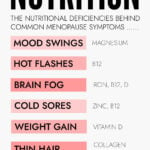
Menopause symptoms are a struggle for many women but these issues aren't always symptoms of menopause itself. They can actually be signs our body is hungry for basic nutrients.
Body changes in our 40s and 50s need extra nutrients but lots of us go short for years so don't have the fuel to change gears as menopause kicks in.
Nourishing our bodies with core nutrients can relieve symptoms of menopause or at least provide the foundation for other relief to build on.
So in this guide I'll try to share what I learned about nutritional signs behind common and surprising menopause symptoms including :
- Changing Nutritional Needs
- Common Signs Of Menopause
- Surprising Signs Of Menopause
- Sugar, Sugar, Sugar!!
- Other Mid Life Issues
- How To Nourish Menopause
I do hope the guide helps and gives you the energy to embrace the new joys and challenges of midlife and beyond.
NB I am not a doctor. This is not medical advice. Talk to a doctor.
Table of Contents
Changing Nutritional Needs

Our nutritional needs fundamentally change during menopause due to :
- Estrogen Decline
- Increased Stress
- Digestive Changes
- Immune Shifts
Estrogen Decline
Estrogen decline in menopause affects our ability to absorb and metabolise 3 critical nutrients : vitamin D, calcium, and iron. It also cuts collagen so we need more vitamin C to make more.
Increased Stress
Big changes in the balance of our hormones is stressful for our body and ramps up demand for magnesium and B vitamins to manage cortisol and support mood, sleep, and energy.
Digestive Changes
Reduced stomach acid in menopause - who knew?! - impairs B12 absorption and the metabolic changes triggered by estrogen decline have a knock on effect on how we digest zinc.
Immune Shifts
Lower estrogen weakens our natural immunity, increasing the need for key immune-supporting nutrients including iron, retinol, zinc, vitamin D & vitamin C.
Many of us go through perimenopause with nutritional deficiencies we ignore and so hit menopause with shortages when our body is craving more!
Common Signs Of Menopause

Many of us will have heard about these common symptoms of menopause but not heard about the nutritional shortfalls that can be triggering them :
- Hot Flashes & Night Sweats
- Mood Swings
- Irregular Periods
- Sleep Troubles
- Weight Gain
- Brain Fog
- Head Aches
Hot Flashes & Night Sweats
Suddenly feeling like a sauna or waking up soaked is common in menopause.
In menopause magnesium should take over balancing stress hormones e.g. cortisol from falling estrogen. If magnesium is low the handover fails.
And it gets worse because cortisol spikes use up magnesium faster.
We then have even less magnesium to manage cortisol or do its other key role of regulating body temperature!
Take Away : Low & falling magnesium causes a wonky thermostat
Mood Swings
Feeling fine one minute then snappy or teary the next is a common sign we are short on B vitamins and especially B12.
With more stress hormones around we need more B vitamins to produce the mood-regulating neurotransmitters serotonin and dopamine.
Roughly 10% of women - 30% of vegetarian/vegan women - are B12 deficient going into menopause but this shoots up in menopause to 20% of women and an estimated 60% of vegetarian/vegan women because :
- Our body needs more B12
- But our gut absorbs less because of falling stomach acid.
Take Away : Low B12 makes us moody
Irregular Periods
Periods can be more frequent in perimenopause and irregular but very heavy during menopause itself.
Heavy bleeding depletes iron stores throughout perimenopause and menopause causing chronic iron deficiency and all sorts of symptoms including fatigue, anxiety and infection.
In perimenopause up to 25% of women - 50% of non-meat eaters - are low in iron. After periods stop, we struggle to restock as we absorb less as we age.
Take Away : 1 in 4 women are low in iron when they hit menopause
Sleep Troubles
If you can’t fall asleep or wake up at 3 a.m. with a racing mind in menopause, it's a good chance again that low magnesium is the problem.
Magnesium is key for our sleep cycle.
And as we saw earlier we can get stuck in menopause in a vicious circle of low magnesium causing low magnesium!
Take Away : Sleep needs magnesium
Weight Gain
Weight gain around our waistline is common in menopause and it is easy to think it is just our metabolism slowing down naturally.
But it is not a done deal.
Vitamin D helps regulate metabolism. Falling estrogen cuts vitamin D. Vitamin D deficiency contributes to visceral fat.
As many as 50% of menopausal women in the USA are estimated to be vitamin D deficient. In Britain it reaches 60% and in Ireland 65%!!
Take Away : Tummy fat is a sign of low vitamin D - who knew?!
Brain Fog
Forgetting where we parked or losing our train of thought mid-sentence is a classic symptom of menopause.
But again the real culprit can be diet.
3 deficiencies we've already seen have big impact on brain function and fog :
- Vitamin B12
- Iron
- Vitamin D.
Add in low levels of B9 folate and our brain will just not be at its best.
Take Away : Our brain is hungry!!
Head Aches
More frequent headaches or migraines popping up out of nowhere is pretty common in menopause.
Our old mate magnesium again plays a key role here both balancing stress hormones and relaxing blood vessels that tense up as estrogen fluctuates.
And it's that vicious circle again: we use up more magnesium when it is low!!
Take Away : Magnesium eases tension
Surprising Signs Of Menopause

Less known menopause signs include :
- Thinning Hair
- Joint Pain
- Heart Palpitations
- Tingling & Burning Sensations
- Cold Sores
- Receding Gums & Gum Disease
Thinning Hair
Both perimenopause and menopause are tied to thinning hair in women.
Low iron, zinc, B12 and vitamin D play big roles throughout our 40s in :
- Rapid hair loss
- Excess shedding
- Poor re-growth
- Thin stands.
In full menopause collagen and omega-3 can go missing in action leaving us even more vulnerable and 30% of post-menopausal women have thinning hair.
Take Away : Feed your hair
Joint Pain
Feeling achy or stiff in new places in menopause is NOT just ageing.
Falling estrogen decreases vitamin D activation - as we've seen - PLUS calcium absorption. This is a double whammy as vitamin D deficiency also reduces calcium uptake.
So joint pain in menopause can be due to vitamin D and calcium deficiency. Although arthritis and osteoporosis - as we'll come to - play a part.
Take Away : Joint point can be down to low calcium and vitamin D levels
Heart Palpitations
A racing heart or skipping beats is scary but not rare in menopause.
We should always see a doctor.
You doctor may discover that the problem is yet again low magnesium as it is critical for regulating heart rhythm.
Take Away : See a doctor
Tingling Or Burning Sensations
Tingles in hands and feet or a burning tongue are also weird symptoms of menopause set off by low nutrients.
B12 is absolutely critical for neural and nerve health and we've seen that B12 gets hit hard by falling estrogen and reduced stomach acid in menopause.
Take Away : Going short in vitamin B12 can really get on our nerves!
Cold Sores
More frequent outbreaks of cold sores is another surprising but not uncommon symptom of menopause.
T-Cells in our immune system keep the cold-sore herpes virus dormant. Pre-menopause estrogen plays a key role in regulating our immune system.
As estrogen drops, zinc and vitamin D have to step up and pull some extra weight but huge numbers of us hit our 50s running short from dodgy diets.
Take Away : Our T-Cells need extra helpings of vitamin D & zinc in our 50s
Receding Gums & Gum Disease
Bleeding, tender and receding gums is horribly common during menopause.
Shortfalls in our old friends zinc and collagen and the other key gum health nutrients vitamin C and E and COQ10 are very often the problem.
Take Away : Nutrient low gums suffer
So our big take away message is that many of the common and surprising symptoms of menopause are actually down to nutritional deficiency.
However, other forces are at work.
Sugar, Sugar!!!

Sadly, we have to get real in mid-life about all the ways sugar makes us sick.
It is NOT just the risk of diabetes if we are carrying too much weight.
Excess sugar messes with :
- Hormones making hot flushes & mood swings worse
- Nutrient absorption in our gut
- Cell energy levels.
And it is a trigger for chronic issues that appear mid-life including :
- Thyroid problems
- Lupus
- Arthritis
- Osteoporosis.
To tackle menopause symptoms we must boost nutrients AND tackle sugar!
The good news is tackling both can help with other mid-life issues.
Other Mid Life Issues

Women are at risk of developing a wide range of other mid-life issues during menopause including :
- Thyroid Problems
- Diabetes
- Lupus
- Arthritis
- Osteoporosis
- Heart Disease
- Hypertension
It can be confusing because the symptoms of these issues can overlap with the menopause symptoms often triggered by nutritional deficiency.
However the same deficiencies are also risk factors for these diseases. Tackling low nutrients and sugar can help manage other mid-life issues.
But always see a doctor about new health symptoms during menopause.
How To Nourish Menopause

It is easy to get bogged down in the symptoms of menopause and to be swept away by grand claims for all sorts of faddish menopause remedies.
But often we just need to give our changing body the new levels of nutrition it naturally needs to thrive.
The single best thing I did was get blood tests for key nutrients from my local pharmacist. It wasn't cheap but not crazily pricey - less than $200.
It let me see where I was short in the nutrients my body needed more of :
- Magnesium
- Iron
- Zinc
- Calcium
- Vitamin B12
- Vitamin D
- Vitamin C
- Vitamin E
- Omega-3
- Collagen
And the results were eye opening!!
I was crazily short on critical goodies despite a "healthy diet". So much so I took the plunge and ate red meat again after 30+ years as a vegetarian.
Tackling these deficiencies with a better diet and basic supplements I transformed my health and eased symptoms from night sweats, mood swings and headaches to thinning hair and horrid gum disease!!
So if you are hitting menopause and struggling, your first step is to find out for real if your diet is falling short and actually give it what it needs to nourish you in the next stage of life.
If you found this helpful, do save on Pinterest to come back to and please share with friends and family.
For more simple healthy living tips check out my other natural remedies and follow me on Pinterest.











Leave a Reply